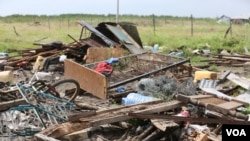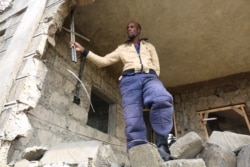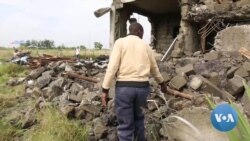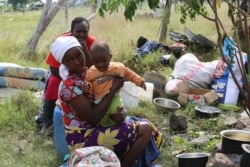Kenyan authorities have forcibly evicted more than 7,000 people from land in Nairobi slums over the last month, defying a court order. Authorities say they demolished homes because they were built on public land, but critics say mass evictions during a pandemic are inhumane and could further spread the coronavirus.
Forty-two-year-old Daniel Ndungu saw the three tractors coming before his home was demolished last week.
"We saw police officers coming into the area," he said. "They blocked the road and left the only one used by tractors. At around nine they started demolition. They didn't care whether there were children in the house or anything else. They began demolition.”
Defying a court order, authorities on Friday forcibly evicted Ndungu's family and other Nairobi slum dwellers, making them homeless in the middle of the coronavirus pandemic.
Ndungu says he has nowhere to go and no money to move, so he will stay in the cold and wait.
Others moved into the crowded dwellings of friends and relatives.
The evictions, which started in April, left more than 5,000 people homeless earlier this month in Nairobi's Kariobangi neighborhood.
The state-run Nairobi City Water and Sewerage Company (NSWSC) claims ownership of the land and says the families have been occupying it illegally since 2008.
"People are told this in advance: You are sitting on public land, there is a project that is terminating here, we may probably open up and open sewage in this direction," said Fred Matiangi, interior minister. "People know this but, then people either ... don't move or just continue staying there."
Thirty-seven-year-old butcher Hussein Wako says he has government receipts showing he owns the land he was forced to leave.
But public land is too often sold illegally in Kenya, leaving those who were cheated out of their money – like Wako – homeless.
"They demolished our home and poor people's homes," Wako said. "I slept in the cold for two days, and there is a coronavirus pandemic. They told us to go back home when we demonstrated against the demolition. They disrupted it and tear gassed us.”
A small riot erupted earlier this month as the evicted clashed with police in Kariobangi and set fire to cars and tires.
A Kenyan high court ordered a halt to further demolitions until a petition by residents is heard in June. But for the thousands of Kenyans already left homeless, and those still being evicted, there is little hope for justice.








